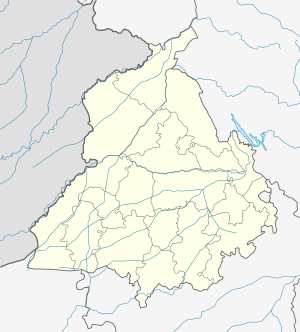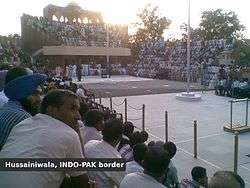Hussainiwala
| Hussainiwala ਹੁਸੈਨੀਵਾਲਾ | |
|---|---|
| village | |
|
Flag lowering ceremony at Hussainiwala Border, Far side is Pakistan and near side is India | |
 Hussainiwala Location in Punjab, India | |
| Coordinates: 30°59′51.56″N 74°32′49.62″E / 30.9976556°N 74.5471167°ECoordinates: 30°59′51.56″N 74°32′49.62″E / 30.9976556°N 74.5471167°E | |
| Country |
|
| State | Punjab |
| District | Firozpur |
| Languages | |
| • Official | Punjabi |
| Time zone | IST (UTC+5:30) |
| Nearest village | Ganda Singh Wala |
Hussainiwala (Punjabi: ਹੁਸੈਨੀਵਾਲਾ)is a village in Firozpur district in Punjab state, India. It lies near the bank of the Sutlej river. The village is on the border with Pakistan, opposite the Pakistani village of Ganda Singh Wala.
The National Martyrs Memorial
Hussainniwala is the site of the National Martyrs Memorial, which marks the location where Bhagat Singh, Sukhdev and Rajguru were cremated on 23 March 1931. It is also the cremation place of Batukeshwar Dutt, who was also involved in bombing the Central Legislative Assembly with Singh, as well as that of Singh's mother, Vidyawati.
An annual fair takes place at the memorial on 23 March, which is the anniversary of Singh's death.[1] The day is also observed across the state of Punjab.
India–Pakistan border
The border crossing is now closed for travelers, although a flag retreat ceremony is still held daily. Until 1970, it was the principal road crossing between India and Pakistan,[2] and was a trade route for truckers, mostly for the import of Kandahari Angoor (dehydrated grapes) and other fruits and food products from Pakistan and Afghanistan. The border crossing was replaced by the border crossing at Wagah, a little further north. In 2005 there were proposals to reopen the border,[3] but it remained closed.
Retreat Ceremony
Since 1970 there has been a Retreat Ceremony at the border crossing every day at 6 pm, similar to the Wagah border ceremony.[4] Attendees are seated in close proximity here, as compared to Wagah where crowds are kept far apart. And unlike the jingoistic display at Wagah which draws nationalistic tourists from all over India and Pakistan, the Hussainiwala ceremony is a more intimate ceremony attended mostly by local Punjabis from either side of the border. As a result, the atmosphere is not as tense, and Indian and Pakistani attendees often smile and wave to one another, and even cheer for each other's guards as they perform the border spectacle.
Indo-Pakistan War of 1965
At the outbreak of the Indo-Pakistani War of 1965, the 2nd Maratha Light Infantry (Kali Panchwin) was based in Mathura when it was deployed to Hussainiwala in the Firozpur sector of Punjab. It defended the Hussainiwala headworks against an attack by a full infantry brigade supported by armoured columns of the Pakistan Army. The tower on the other side of the river was captured and razed to ground. Lt KM. Palande, Lt. Feroz Doctor, Lt. S Deshpande showed great courage and ingenuity to thwart an enemy frontal attack. The enemy also used artillery fire and air support in this engagement. Two enemy tanks were destroyed and two captured, with several enemy killed. The commanding officer Col. Nolan was killed by an enemy artillery shelling the next morning while supervising operations. It was a major loss to the battalion. The unit ensured that the Samadhi of Bhagat Singh was not desecrated by the Pak Army. The battalion was visited by then Prime Minister Lal Bahadur Shastri, Defence Minister Kamraj, the Chief of Army Staff and other senior officers. Kali Panchwin was awarded the battle honour "Hussainiwala" for its role in the 1965 War. The citizens of Firozpur, in honour of the Battalion's contribution in defending the Bridge and Firozpur town, presented a silver replica of the Hussaniwala Bridge.
Indo-Pakistan War of 1971
In the Indo-Pakistan War of 1971 many memorials of Bhagat Singh and others were destroyed by Pakistani artillery. Two companies of the 15th Punjab (formerly First Patiala) were attacked by four brigades of the Pakistan Army on 3 December 1971 at 1835 hours. Nearly 4,000 Pakistani men attacked the Indian side with 15 tanks and heavy artillery support. The Indian commanders included Major Waraich, Major Singh's and Major Kanwaljit Sandhu, who was badly injured. Major SPS Waraich was reported captured, as were many JCOs and men as the squadrons were taken by surprise and had little time to get to their bunkers. A Pakistani radio news telecast reported (in Urdu) that Maj Waraich hamari hiraasat mein hain (Maj Waraich is in our custody). There was a subsequent report that Maj Waraich was in a North West Frontier jail. Their current status is unknown. They are listed as missing by the Indian Government along with 52 others including a Maj Ashok Suri who wrote a letter to his father in 1975 from Karachi stating that he was alive and well. Pakistan denies holding any men Missing in Action.
Peer Baba Hussainiwala ji
The village is named after the Muslim Peer Baba Hussainiwala ji (Saint Hussaini wala or Saint "who is of Husain"), whose tomb is in the Border Security Force headquarters at Hussainiwala.
